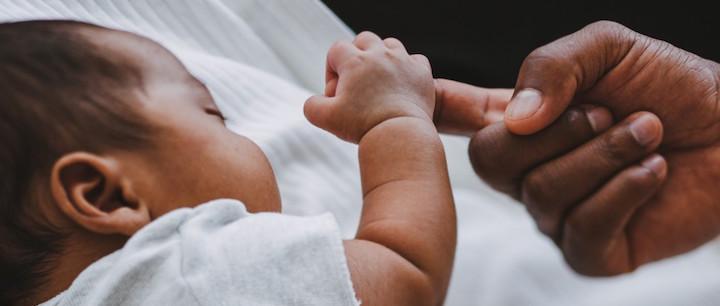
I got my dad’s recessive blue eyes. This doesn’t happen too often though, which always gets people guessing about which traits their baby will ultimately inherit. As you probably remember from your middle school biology, each parent gives 23 of the 46 total chromosomes, which means the baby is getting 50% genetic material from each parent. Genetic traits are expressed through dominant and recessive alleles. What does that mean for each of the traits though?
A child’s eye color will be determined by the amount of brown pigment in the iris. Blue is a recessive trait, which means it’s the least likely eye color. Likewise, darker hair colors are generally dominant over lighter hair, which is why it’s less common to see natural blondes than brunettes, but there can be a range of hues and shades. Red hair is the least common because it requires two recessively expressed genes. Features like dimples, freckles, cleft chins, teeth, and many more are subject to the same genetic lottery as other parts, with recessive traits still the least likely to be expressed.
When it comes to the final height of your child, nature basically sets a max height and nurture can stop a child from reaching it. A healthy boy will typically grow to be a little taller than the average of the mother and the father, while a healthy girl will be a little shorter than the average of her parents. Obese parents do tend to have heavier children, and there is a gene identified that contributes, but it’s still hard to separate nature from nurture here. A child’s lifestyle habits and diet have a significant impact on weight, so even children who come from obese parents can usually overcome family history with good lifestyle choices.
While it’s far from being conclusive, most research suggests that your genetics play a much bigger role in intelligence than your environment. While you can foster your child’s intelligence, about 75% of the child’s IQ is probably already fixed at birth. On the other hand, although many personality tendencies are hardwired from genetics, most of it can be changed through the environment. For example, naturally gifted musicians can lose the talent by never cultivating it, while musicians who were born average can become great through effort.
What your child looks and acts like will depend on random chance. Because of all of the different genetic material, there are trillions or quadrillions of combinations for a single child, with an infinitesimally small chance for a couple to have the same kid twice. This is without including the possibility of genetic mutation. In the end, the only true way to see what your kid will be like is to watch him or her grow up.
Read More:
Baby Eye Color Calculator
When Am I Most Fertile?
Pregnancy Symptoms: Early Signs You May Be Pregnant
